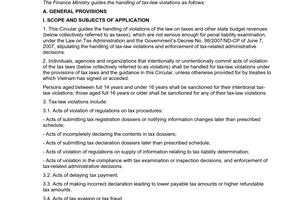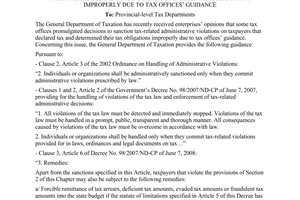Nội dung toàn văn Official dispatch 1071/TCT-CS statute of limitations for penalties for tax law violations
|
MINISTRY OF
FINANCE |
SOCIALIST
REPUBLIC OF VIETNAM |
|
No.1071/TCT-CS |
Hanoi, April 02, 2013 |
|
To: |
- Tax Department of Can Tho province; |
In response to official dispatch No.339/CT-KTNB dated November 22, 21012 of the Tax Department of Can Tho province and official dispatch No.04/CV.CPCBTPXK dated February 25, 2013 of West Food JSC asking for information on statute of limitations for penalties for tax-law violations, the General Department of Taxation has opinions as follows:
- As prescribed in Clause 4 in Article 24 of the Law on Value-Added Tax 1997 and Clause 4 in Article 29 of the Law on Enterprise Income Tax 1997:
“4. Upon the discovery of and conclusion on a false tax declaration, tax evasion or errors, tax authorities shall take responsibility to collect tax arrears, fines or refund tax payment within the last five years from the day on which the false tax declaration, tax evasion or errors are detected. In case business facilities fail to make registration, declaration or tax payment, the duration for collection of tax arrears and fines shall take effect from the date such business facilities commenced their operation.
- Statute of limitations for penalties for tax-law violations is prescribed in Clause 2 and 3 in Article 110 of the Law on Tax Administration as follows:
“2. For violations of tax evasion or fraud not severe enough to face criminal charges, late tax payment, inadequate declaration of tax liabilities, the statute of limitations is five years from the day on which the violation is committed.
3. Upon the expiration of the statute of limitations for penalties for tax-law violations, taxpayers will not face a penalty; however; they still have to make full payment of tax arrears, tax gap earned from evasion or fraud into state budget.”
- As prescribed in point 1.2 and 1.6 in section IV in part A of Circular No.61/2007/TT-BTC dated June 14, 2007 of the Ministry of Finance:
“1.2. For tax evasion or fraud not severe enough to face criminal charges, late tax payment, inadequate declaration of tax liabilities, the statute of limitations is five years from the day on which the violation is committed to the day it get caught and reported in writing ( except from the case in which a written report is not required)
The time for determining tax evasion or fraud for determining the statute of limitations for penalties for tax-law violations is the date following the deadline for submission of tax declaration dossier of the tax term or the deadline for submission of annual tax statement (as required) on which taxpayers commit tax evasion or fraud. For cases in which the tax authority is required by law to issue a decision on tax refund, tax emission, the time for determining tax evasion is the date after the date on which the decision is issued by the competent authority.
1.5. Upon the expiration of the statute of limitations for penalties for tax-law violations, taxpayers will not face a penalty; however; they still have to make full payment of tax arrears, tax gap earned from evasion and fraud into state budget.”
- Official dispatch No.757/TCT-PC to Tax Department of provinces, cities providing guidelines for penalties for tax-law administrative violations for cases in which taxpayers declare and define false tax liabilities under the guidance of the tax authority submitted to Tax Department of province and cities by the General Department of Taxation on March 06, 2009 specified:
“In case taxpayers declare and define false tax liabilities under the guidance of the tax authority which leads to the understatement of tax liabilities as required by law, the tax authority must be responsible for its mistake In this case, tax authority shall adopt a solution of full collection of tax arrears as regulated and claim responsibility for penalties for tax-law administrative violations as follows:
1) Do not impose penalties for late tax payment and understatement tax liabilities due to false declaration in cases:
- Taxpayers declare, adjust and pay tax arrears into the state budget on their own.
- The tax authority had examined and recorded in writing with taxpayers to re-determine tax liabilities and taxpayers already paid tax arrears into state budget upon the announcement of tax authority.
2) Impose penalties for late tax payment in case tax authority had taken minutes of re-determination of tax liabilities with taxpayers and informed them for making payment of tax arrears into state budget, yet taxpayers failed to fulfill their obligations as announced.
The time for penalties for late tax payment is counted from the deadline for tax payment specified in the announcement of tax payment of tax authority.
3) In case taxpayers declare understatement tax liabilities under the guidance of tax authority, the tax authority must claim its responsibility, define relevant tax formula for imposing penalties in accordance with Part C of Circular No.61/2007/TT-BTC of the ministry of Finance providing guidelines for penalties for tax-law violations.”
Official dispatch of West Food JSC stated: Founded in June 2003, the company had its ownership transferred to Can Tho Techno – Agricultural Supplying Jsc pursuant to official dispatch No.291/UB dated January 25, 2005 of People’s Committee of Can Tho city.
After completely satisfying regulations on ownership and starting its operation from April 2005 to the end of 2005, the company submitted official dispatch No.07/CV 2006 to the Tax Department for the purpose of registering preferential duration for investment from January 01, 2006 and requiring tax finalization to determine the time for preferential investment. As for that reason, Can Tho Tax Department was issued decision No.151/QD-CT dated March 03, 2006 by the General Director of Can Tho Tax Department on examination of tax finalization at WFC. After examination which was recorded in writing on March 27, 2006, taxable income of the company is VND 2,779,184, payable general tax rate is 28% and payable income tax is VND 778,172 according to the above-mentioned record.
Now, the record in examination of tax law compliance at WFC dated November 22, 2011 pursuant to Decision No.1088/QD-CT dated October 13, 2011 on re-determination of preferential duration for investment from 2005 leads to the increase in enterprise income tax in 2007.
According to above-mentioned presentation of the company, pursuant to regulations in legislative documents, the Tax Department are required to determine the statute of limitations for penalties for tax-law violations of entities and collect tax arrears as regulated in consideration of each particular time the violation is committed and legislative documents at that time.
|
|
PP. GENERAL
DIRECTOR |
------------------------------------------------------------------------------------------------------
This translation is made by LawSoft and
for reference purposes only. Its copyright is owned by LawSoft
and protected under Clause 2, Article 14 of the Law on Intellectual Property.Your comments are always welcomed






